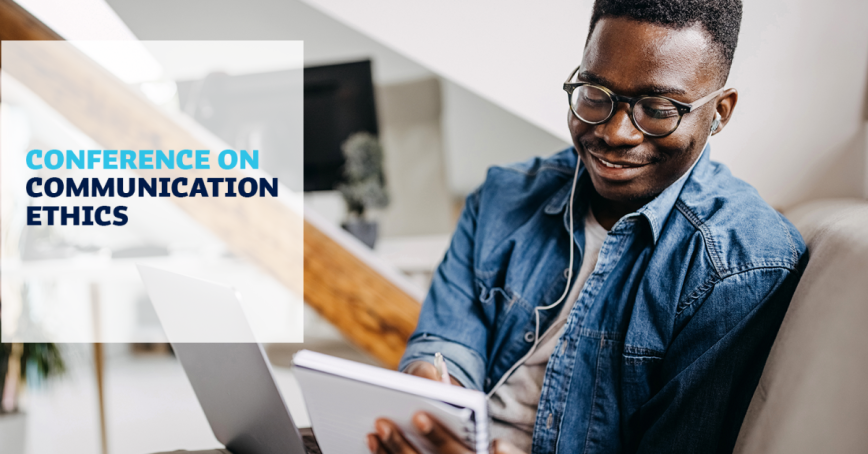Watch the recordings: Conference on Communications Ethics

How can ethical communication help to restore humanity?
That's the topic of the School of Communication and Culture's 2023 Conference on Communications Ethics, hosted virtually in February.
Each of the nine sessions are available online, and explore themes including Indigenous professional communication, AI and post-secondary education and socially engaged theatre.
"The conference is an opportunity for people interested in how meaning is created and distributed within society to consider ethical components of perhaps what makes humans most unique, our ability to communicate," says Assoc. Prof. Chasten Remillard, program head of the Master of Arts in Professional Communication program.
Learn more about the below sessions, including full speaker bios.
Story, Engagement, and Relationality: Perspectives on Indigenous Curriculum, Research & Pedagogy
Russ Johnston, Jasmine Dionne, Geo Takach & Chaseten Remillard
How do we create Indigenous curriculum through the act of visiting? Join us as we consider the various ways that relationality intersects with communication studies, pedagogy, and the academic space.
“Indigenous knowledge is so widespread and so broad and I think that a lot of times because we work in silos, that Indigenous studies or Indigenous education is seen to exist on it’s own. But there are elements of theoretical components from communications, from political science and so forth that exist within and outside of Indigenous knowledge.” – Jasmine Dionne, Royal Roads Indigenous Education Instructional Designer
Poetry & the Language of Decolonization
Dr. Sarah de Leeuw
So-called Canada and British Columbia are extraordinary examples of sustained coloniality. Exploring historical and contemporary (white) colonial violence risks, drawing from M. Nourbese Philip, “doing a second violence.” Anchored in highly narrativized geographies of Haida Gwaii, this poem/paper contributes to ongoing conversations about unsettling Euro-white supremacy.
Why Local News Matters
Robert Remington (moderator) with Dawn Walton, Rob Germain, Dave Obee and Bhupinder S. Hundal
In an era of disinformation, rampant conspiracy theory, and accusations of “fake news,” local media outlets remain a reliable space for credible information. Local media organizations are the closest to the people. They collectively raise millions for charity, hold public officials accountable, connect community, and help create a shared community culture. Yet local news is not without challenges. Dying newsrooms damage communities. In the absence of strong local media outlets, extreme voices are amplified on social media. This panel of experienced journalists share their thoughts on the successes and challenges they face.
Ethical QuestionING [EQ] and Socially Engaged Theatre: Processes & Procedures
Dr. Taiwo Afolabi
In this session, Dr. Afolabi will share the ways ethical questionING [EQ] can offer researchers and practitioners within diverse contexts (particularly research and community engagement) the opportunity to reflect-before-in-on-actions. Dr. Afolabi will highlight processes and procedures of engaging EQ through some Socially Engaged Theatre projects in Canada and elsewhere. Framed within the lens of reflexivity, social justice, equity, and praxis, ethical questioning calls for a shift of ethics from a morality debate to a political act.
Restoring Humanity in the Classroom
Dr. Lauren Halcomb-Smith and Ken Jeffery
In this session, panelists share insights and reflections from their holistic perspectives as instructional designers, associate faculty, and education researchers. We will ask: is it enough to “restore” humanity in the classroom, or are there opportunities to remake our way of teaching in this new landscape of higher education?
Indigenous Professional Communication
Alison Tedford Seaweed, Juli Holloway, Dr. Wayne Clark and Timothy Kenny
When considering the indigenization of professional communication, it is important that practitioners first understand decolonizing principles to reinforce Indigenous ways of knowing of being. Therefore, decolonization as a grounded approach will be conveyed as a framework. Panelists discuss aspects of defragmenting organizational strategies in consideration of Indigenous voices that integrate values of respect, reciprocity, and renewal.
'Iran protests didn't happen': Defenseless Women Amid Western Hypocrisy
Dr. Yasser Abdelrahim
This talk focuses on Western media coverage of the protests in Iran that erupted after the death of the 22-year-old Iranian woman Mahsa Amini in September 2022. Probably picturing protests and counting the death toll in Iran, Western media coverage not only lacks an understanding of the gravity of the situation in Iran but overlooks that some Western governments maintain trade and investments with the Iranian regime. This talk sheds light on the difference between current protests in Iran and the ‘White Revolution’ that led to the change in the Iranian regime in 1978, explains how current protests may not necessarily help Iranian women obtain more civil rights, and indicates how Western media could gradually contribute to a processual change of the social order in Iran.
Re(Story)ing Our Humanity: How Are We Going to Be Together in the Times Ahead?
Dr. Veronica Thompson, Raaj Chandran, Dr. Hilary Leighton and April Kuramoto
This session considers a plurality of ideas of what it means to be fully human at this moment of unparalleled planetary change in a world fraught with polarities and increasing divisiveness. This is a lively dialogic inquiry of how we might be together in the times ahead and in particular, what regenerative stories we might be summoned to tell and to live into the world now
A Conversation with ChatGPT
Dr. Aiden Buckland, Tyler Nagel and Megan Reimer
Join ChatGPT as it answers your questions about its role in higher education. This session is interactive and informal, with the hope that you will gain a sense of the capacity for AI to generate text, but that you will also gain an appreciation of how it may be both useful and disruptive to post-secondary and professional communications.